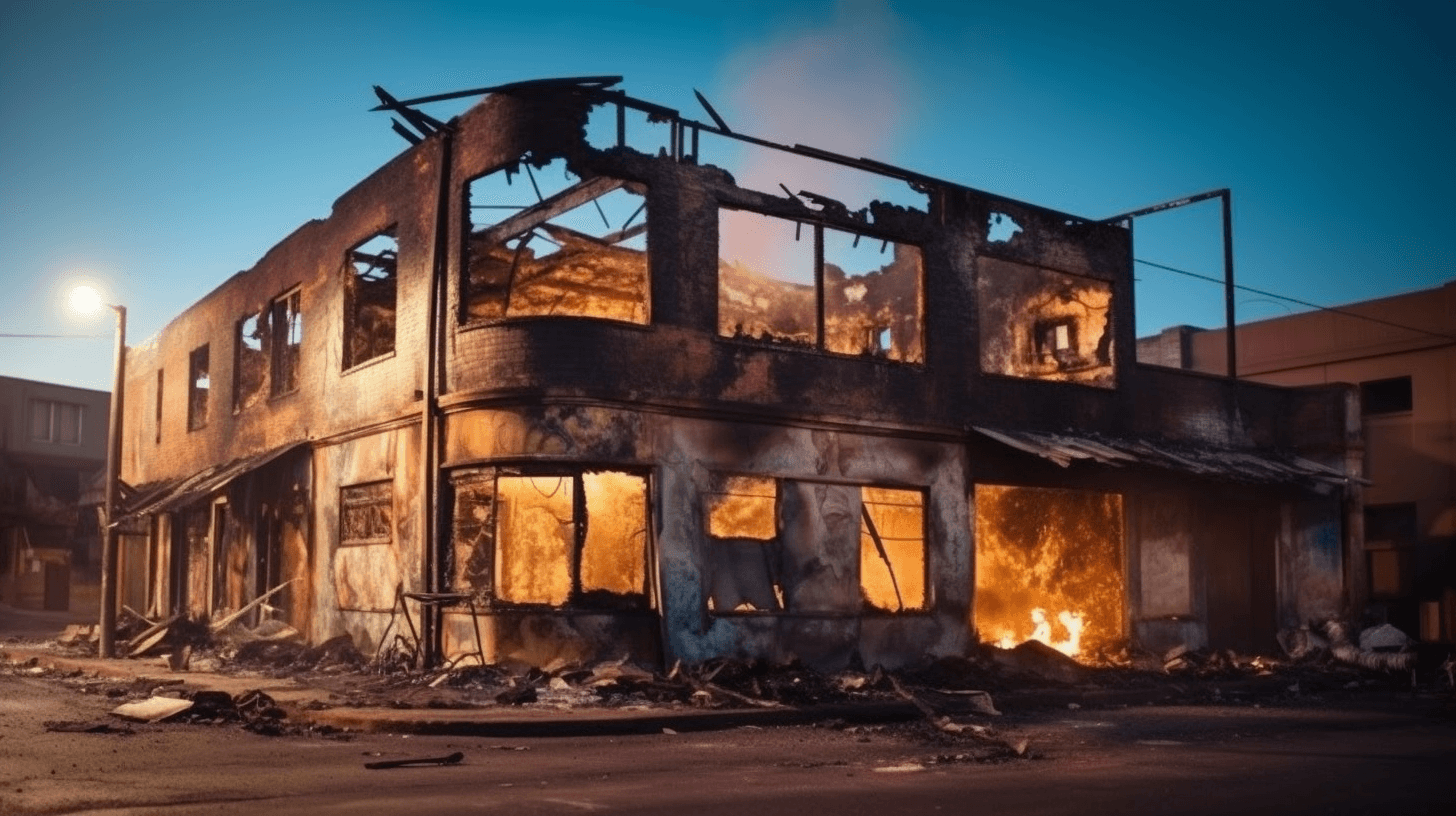💥🔥 Da Big Fire Tragedy: Jozi City’s Hidden Time Bomb
⬇️ Pidgin | ⬇️ ⬇️ English
Aloha kākou! Check dis out. Rememba da fire wey wen tear up one old building in Johannesburg back in August? Da kine fire wey wen leave 77 people no breathe? Yeah, dat one. Fo’ years, da city guys wen promise fo’ check all da junk buildings and fix um up so no more dis kine bad stuffs happen. But guess wat? Neva did.
So, da Times guys, dem wen dig deep, go all ova da place, block by block, and guess wat? Dey find at least 127 buildings right in da heart of da city all bus up and left fo’ rot. Da kine wey just waiting fo’ one more big tragedy happen. 🏚️🚒
Da officials, dem blame da immigrants and da easy-kine housing laws, but Times wen find out get plenty more deep kine stuffs going on. Right in da middle of Africa’s richest city, Johannesburg, get one big mess, and nobody really seeing it.
Just few days afta da fire, da city guys wen do one big show fo’ da media, one police raid, like something outta one movie. Da fire wen go wild in a government property, 80 Albert Street, wey was one real death trap. People living dea wen steal electricity, make their houses from cardboard, and cook on kerosene stoves. Da authorities, all dey could do was check da ashes afta. 🚓🔍
But den, dey shift their eyes to Vannin Court, anotha government building. Dis one eight floors high, hundreds of people living dea, no water, no power. “When people die in these buildings, it is da city of Johannesburg dat gets blamed,” one city official wen tell on TV just before da raid.
Da police cars wen surround da building, officials wen go inside and find da elevator shaft full of opala (trash), three floors high. Get one bathtub full stink water. Da building was all chocked up with da smell of cooking, rotting rubbish, and human waste. Crazy, yeah? 🚽💩
Da city guys always blame immigrants and da new housing laws fo’ all da bus up buildings. But Times wen find out, fo’ decades, plenty governments and political parties wen just look da other way. Da city’s property management agency, suppose to be taking care of tings, is broke, even though get thousands of properties, even in da rich parts.
Dis agency, always get rumors about corruption, neva even get one proper list of wat dey own. Some small-time city guys wen take advantage by collecting rent from squatters. 😲💵
So, da city government basically wen leave their buildings in downtown, just like da private landlords wen do. Now, get armed guys, desperate families, and people looking fo’ one chance wen move in. Dese buildings, now just like vertical slums, right dea, everybody can see.
Even though get all kine dangers – fire, crime, and more – da guys from da property agency and da mayor’s office neva even try fo’ keep track of all these junk buildings, da first step fo’ stop future disasters. So, Times reporters wen make their own list of all da beat-up buildings in central Johannesburg. Dey wen check city records, housing lawsuits, talk story with one lawyer who represents landlords, den wen go see da buildings and talk with da tenants and odda people. 🏢🔥
Da count from Times is actually small kine, considering how much blocks in da city stay all worn out and showing signs of illegal and unsafe living. Da cause of da 80 Albert Street fire still unknown, but da buildings stay so dangerous, seems like one more bad kine ting going happen fo’ sure. In just four weeks afta da Albert Street fire, had three more fires in odda run-down buildings, leaving plenty people without one home.
“Get buildings wey safer to stay on da street than live inside,” one lawyer wen say. Vannin Court was just one of several buildings da police wen raid afta da fire. Dey wen say dey going check um out, maybe even clear um out to prevent da next disaster. But, no change.
Da people living dea, dey knew. Da officials knew too. Da city neva fix da building fo’ nearly twenty years, even though had plenty odda raids. In fact, dis was da second raid in about five months.
Back in da early 1990s, when white families wen start leaving downtown Johannesburg, banks wen stop lending money dea. Real estate values wen drop, landlords wen struggle. No pay for utilities, so da city wen cut off power and water. Dat’s when
da armed guys wen move in.
In 2007, da city wen take ova da building but couldn’t do much. By law, housing is a human right. If da government wants to evict people, dey gotta find somewea else fo’ dem live.
All da plans fo’ fix up da place wen fail. Da city wen propose giving da buildings to developers or city agencies dat build affordable housing. But no plan fo’ da tenants during renovations. “Dey want to rescue da buildings,” one housing lawyer wen say. “Dey could not care less fo’ da people.”
One big issue is da politicians no like build housing fo’ immigrants. “Da city does not get money fo’ keep building properties fo’ all dese people coming in,” one government guy wen say.
Da city’s property manager, da Johannesburg Property Company, also contributes to da neglect. Da agency is in charge of leasing and maintaining nearly 30,000 city properties but now, dey da ones no taking care proper.
Dey resist letting people check their lease agreements, even city officials and their own board of directors. “We didn’t even know how many buildings we actually owned as da city,” one former mayor wen say.
Da chief executive of da agency, Helen Botes, wen get suspended twice in three years. Get allegations of her spending millions on shady cleaning contracts during da coronavirus pandemic without da board’s approval.
In interviews, former board members wen talk about one culture of intimidation and retribution. Dey said Ms. Botes and her executives keep information from dem about agency operations. But Ms. Botes, a civil servant, has outlasted 10 mayors.
“It’s meant to be chaotic,” one former board chairwoman wen say, “so dat den get money disappearing into people’s pockets.”
Da Johannesburg Property Company also owned and was supposed to take care of da 80 Albert Street building. When officials wen check da place in 2019, dey noted da flammable partitions, blocked fire exits, shacks on da roof, and rats on every floor. But nobody wen come back to fix da problems, nor did anyone try to take control from da criminals collecting rent.
Ms. Botes and da property agency neva answer when asked fo’ comments, referring questions to da city manager. Da city manager’s spokesman neva respond either. Same neglect stay happening at Vannin Court. In 2019, da Johannesburg Property Company wen contract with one private developer to renovate da building into mixed-income apartments. Dey wen do one tenant survey, install turnstiles, and architects wen draw plans.
But da project neva go through. Da city neva make solid plans fo’ house da tenants. Da developer wen run out of money. Both da security company and da architect said dey neva get paid.
Afta da Albert Street fire, two city officials wen use da tragedy fo’ political talk: one in charge of transportation and da odda overseeing public safety. Dey wen focus on immigration, raiding six buildings, and in one case, evicting tenants without a court order. Dey blamed immigrants fo’ da crime and blight. But wen da media attention wen fade, da raids wen stop. “I am tired,” one of dem wen say afta his last raid.
Da survivors of da Albert Street fire wen move into nearby run-down buildings. A public inquiry into da cause of da fire neva really start. Da hearing place itself neva meet safety standards, considered one fire hazard by da city’s emergency services.
About da data: Da New York Times wen gather all dis info from documents from da Johannesburg Property Company, past city administrations, and odda records. Dey wen check um out by going to da buildings and talking with da tenants and odda people. Dey wen look fo’ buildings wey had violation of fire safety codes, no basic services, clear signs of structural problems, damage from past fires, unrestricted access, and signs of overcrowding. Reporters wen confirm ownership and odda info through da Johannesburg GIS system. 📊🔍
So, das da scoop. Jozi City, Africa’s richest, get one big kine hidden problem with all dese old buildings. And looks like nobody really ready fo’ fix um up. Stay safe out dea, yeah? 🌍🔥🏚️🚨
NOW IN ENGLISH
💥🔥 Johannesburg’s Hidden Danger: A City on the Brink of Disaster
Hello everyone! Let’s dive into this story. Remember the fire that ravaged a decrepit building in Johannesburg last August, leaving 77 people dead? That one. For years, the city had vowed to catalog and repair such run-down structures to avert such calamities. But, it never happened.
So, the Times reporters took matters into their own hands. They meticulously searched through records and inspected the city, block by block. Astonishingly, they found at least 127 buildings in the city center in such disrepair and neglect that another tragedy seems just around the corner. 🏚️🚒
Officials have been pointing fingers at immigrants and lenient housing policies, but the Times investigation uncovered deeper, systemic issues. In the heart of Africa’s wealthiest city lies a hidden, dangerous reality that has been largely overlooked.
In the days following the fire, Johannesburg officials resorted to a familiar tactic: a high-profile police raid, akin to a scene from a movie. The fire had engulfed a government property at 80 Albert Street, a veritable deathtrap where squatters stole electricity and lived in makeshift cardboard shelters, cooking on kerosene stoves. The authorities could only sift through the aftermath. 🚓🔍
Their attention then shifted to Vannin Court, another government-owned building. This eight-story structure housed hundreds of people without basic amenities like running water or electricity. “When people die in these buildings, it is the city of Johannesburg that gets blamed,” said a city official on TV just before the raid started.
Police surrounded the building, and inside, they found an elevator shaft clogged with garbage up to three floors high. A bathtub filled with foul water, mattresses crammed into unusable bathrooms, and the air thick with the smell of cooking, decaying trash, and human waste. Truly a grim scene. 🚽💩
City officials have frequently blamed immigrants and progressive housing laws for the abundance of dilapidated buildings. However, the Times’ investigation reveals a history of neglect by various governments and political parties spanning decades. The city’s property management agency is insolvent, even with a portfolio of thousands of properties, including those in affluent areas.
This agency, long plagued by allegations of corruption, lacks an audited inventory of its holdings. Some lower-level city workers have exploited this, illegally collecting rent from squatters, as confirmed by multiple current and former city officials. 😲💵
Effectively, the city government has abandoned its downtown housing, mirroring the actions of many private landlords who have forsaken their buildings. Now, these structures are occupied by armed individuals, desperate families, and squatters, transforming them into visible vertical slums.
Despite the risks – fire, crime, and more – associated with such widespread neglect, officials from the property agency and the mayor’s office have failed for years to even catalog the city’s deteriorating buildings, a crucial step in preventing future disasters. In response to the fire, Times reporters compiled a list of derelict buildings in central Johannesburg, reviewing internal city government records, housing lawsuits, and consulting a document from a lawyer representing landlords. They then visited these buildings and interviewed tenants and others to validate their findings. 🏢🔥
The Times’ estimate is conservative in a city where entire blocks are marred by decay and show clear signs of illegal and unsafe habitation. The cause of the 80 Albert Street fire remains a mystery, but the conditions in these buildings are so perilous that another tragedy seems inevitable. Within four weeks of the Albert Street fire, three more fires broke out in similar dilapidated buildings, leaving many homeless.
“There are buildings where it would be safer to be on the street than to live inside,” said a lawyer who previously represented the city and now works for private landlords. Vannin Court was one of several buildings targeted in the aftermath of the fire. The officials’ plan was to inspect and potentially evacuate these buildings to prevent another disaster, but no real change was enacted.
The residents knew this, as did the officials. The city had neglected to repair the building for nearly two decades, despite numerous raids. In fact, this was the second raid in about five months.
In the early 1990s, as white families left downtown Johannesburg, banks redlined the area, refusing loans. Property values plummeted, discouraging investment from landlords. Eventually, the city cut off utilities due to unpaid bills, leading to the occupation of the building by armed individuals, as recounted by Masindi Cabrali Mmbengwa, a local ward councilor.
The city took control of the building in 2007 but could not initiate major changes. Housing is considered a human right by law, requiring the government to provide alternative accommodations if evictions are necessary.
Numerous city redevelopment plans have failed due to this issue. Proposals to hand over buildings to developers or city agencies for affordable housing fell through
as the city was either unwilling or unable to provide temporary housing for evicted tenants. “They want to rescue the buildings,” stated a housing lawyer. “They could not care less for the people.”
A key stumbling block is the reluctance of politicians to build housing for immigrants. “The city does not have the funds to continuously build properties for the influx of all these foreigners,” remarked a government task force leader.
The city’s property manager, the Johannesburg Property Company, is contributing to this neglect. Despite managing nearly 30,000 city properties, the agency is insolvent and resistant to scrutiny over its lease agreements, even by city officials and its own board of directors, according to former board members, ward councilors, and politicians who oversaw the department.
“We didn’t even know how many buildings we actually owned as the city,” admitted a former mayor.
The agency’s chief executive, Helen Botes, faced suspension twice in the last three years. She was implicated in authorizing millions in questionable cleaning contracts during the COVID-19 pandemic without board approval. Interviews with former Johannesburg Property Company board members painted a picture of a culture of intimidation and retribution. They alleged that Ms. Botes and her executives withheld crucial information about the agency’s operations. Yet, Ms. Botes has remained in her position through the tenure of 10 mayors.
“It’s meant to be chaotic,” explained a former board chairwoman, “so that money can disappear into people’s pockets.”
The Johannesburg Property Company also owned and was responsible for maintaining the 80 Albert Street building. In 2019, officials noted the fire hazards, including flammable makeshift partitions and blocked fire exits, but no subsequent action was taken to address these issues or to challenge the criminals illegally collecting rent.
Ms. Botes and the property agency did not respond to requests for comment, directing inquiries to the city manager, who also did not respond. The same pattern of neglect was evident in Vannin Court. In 2019, the Johannesburg Property Company contracted a private developer to renovate the building into mixed-income apartments. A tenant survey was conducted, security measures were installed, and architects drew up plans.
However, the project stalled due to the city’s failure to provide housing plans for the tenants and the developer eventually ran out of funds. Both the security company and the architect reported unpaid dues.
Following the Albert Street fire, two city officials used the incident for political rhetoric: one in charge of transportation and the other overseeing public safety. They focused on immigration, conducting raids on six buildings and, in one instance, evicting tenants without a court order. They held immigrants responsible for the crime and decay. As media attention waned, so did the raids. “I am tired,” one official commented after his last raid.
Many survivors of the Albert Street fire have now moved into nearby derelict buildings. A public inquiry into the fire’s cause has been delayed. The venue for the hearings was deemed a fire hazard by the city’s emergency services.
About the data: The New York Times gathered this data from documents from the Johannesburg Property Company, past city administrations, and other records. The Times verified the data by visiting the buildings and, in some cases, interviewing tenants and other people. The catalog includes buildings that met five or more of the following criteria: violation of fire safety codes, lack of basic services, signs of structural problems, damage from past fires, unrestricted access, and signs of overcrowding. Reporters confirmed ownership and other information through the Johannesburg GIS system. 📊🔍
That’s the story. Johannesburg, Africa’s richest city, faces a massive hidden problem with its old buildings, and it seems no one is quite ready to tackle it. Stay safe out there! 🌍🔥🏚️🚨







